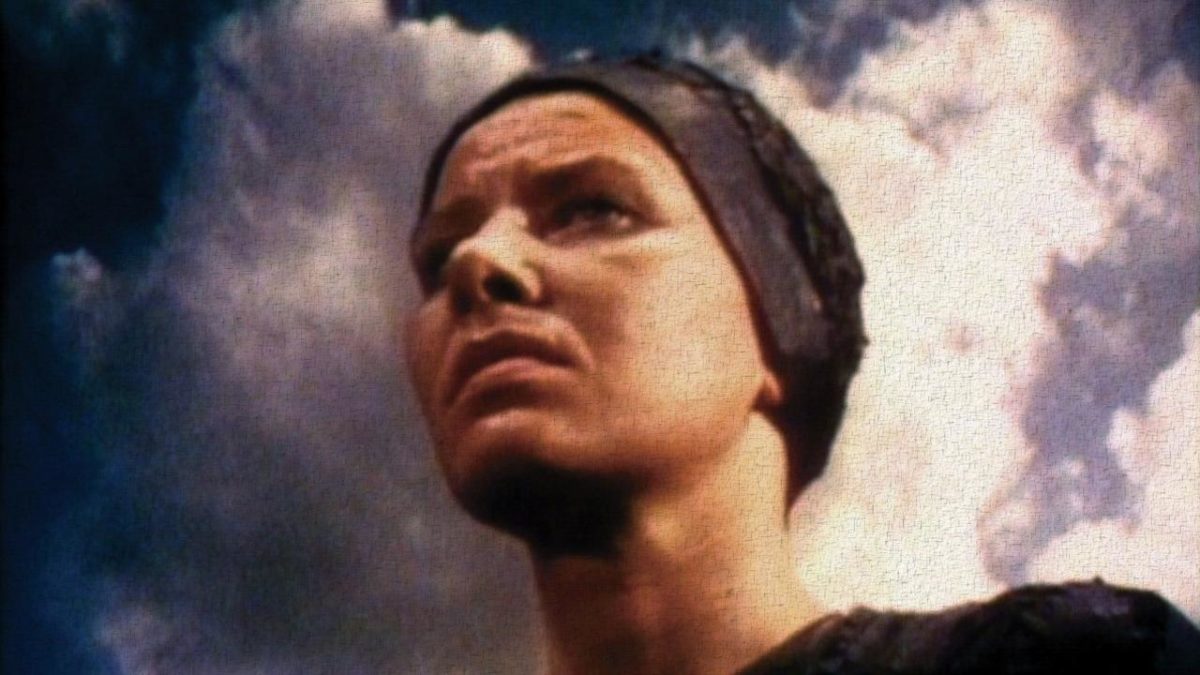When times are troubling and news is confusing, it is always reassuring to unravel the yarn of history. Reenacting the good old days, though, doesn’t come without moral consequences, especially in auteur cinema, where the director equals a deity.
Yorgos Lanthimos is one of those authors known for basing his work on Greek myths, as well as for his theatrical approach to this never-aging material. In fact, just like in classical mythology, his films reveal a tight power structure with a bizarre system of reward and punishment. In Kinetta (2005), it is the camera of the protagonist that establishes the social hierarchy and eyes the victim – the woman, any woman. In Dogtooth (2009), an obsessed patriarch builds a universe from scratch for his family, in order for him to control them. In Alps (2011), there is an informal group performing wicked psychodramatic rituals, and its leader is cruel, restless, and demanding. In The Lobster (2015), it is the whole society that dictates the rules. Respectively, male characters in Lanthimos’ films are either on top of this arrangement or carefully maneuvering inside, never openly rebelling. And by expanding the formal framework with every film, the violence which the initiated are being subjected to grows greater. The filmmaker, though, does not demonstrate any sign of empathy towards his characters, thus leaving a way out for viewers, both emotionally and intellectually – under the disguise of self-irony and political parables.

If there is another contemporary European director whose films have deep roots in mythology and are often being accused of being too abusive and, particularly, misogynistic, it is clearly Lars von Trier. In addition, the chronology of his filmography offers an interesting journey illuminating his love affair with those topics. If his two early feature-length films are excellent exercises on genre and style, setting the map of a decaying and dystopian Europe, the next two – Medea (1988) and Europa (1991) – are projects that deserve special attention. Medea is usually being described as a tribute to Carl Theodor Dreyer, but it can rather be seen as an attempt to edit another major influence in Von Trier’s career: Andrei Tarkovsky. Putting stylistic and cinematographic citations aside, Medea is a film that focuses on the complex and difficult decision a banished mother must make. This is not at all a typical Tarkovskian setting, where main characters are male and women are mostly family members – mothers, wives, daughters. Accusing Tarkovsky of misogynism would be too far-fetched, as the spiritual, existential, intellectual quest of a Soviet man in his films always exemplified that of humanity. Von Trier found an excuse to take a classic story from the Greek myths, one of the hardest to grasp in our culture, and applied Tarkovsky’s mighty methods of filmmaking (texture, choreography, camera movements, editing rhythm). The results are stunning.

Actually, Medea was shot as a TV project right before the culmination of Von Trier’s first trilogy. Moreover, the third act in his Europe triptych – Europa (1991) – is set in post-war Germany as a period when new myths surfaced and was released after the fall of the Berlin Wall, when yet other myths were born. Brought into being by a still emerging director, Von Trier’s Europa is probably one of his most mature works to date. It draws on the Greek myth of Europa as a mortal woman, sexually and emotionally exploited by Zeus (ironically, a whole continent was named after her), and plays with the hint that after the separation of Germany, Europe entered an era of reconfigured power relations without being able to fully take in its convoluted past. In Von Trier’s film, Europe is presented as an imaginary land open to psychoanalytical reading, assisted by the masterful cinematography, another bow to Tarkovsky. Still, plenty is being said through the action as well. One of the most significant scenes in the film shows Jean-Marc Barr’s character, just arrived from America, making love to ZentropaZentropa is the name of the fictional railway network central to the film.‘s heir (Fassbinder regular Barbara Sukowa) as she lies on a railroad diorama in which the train track undoubtedly symbolizes Germany, which in turn symbolizes Europe.
It is also no coincidence that Von Trier adopted the name Zentropa for his production company, founded in 1992. As hard as it might be to believe, Zentropa is a pioneer in pornography films for women, just as it is responsible for the most notable titles from Scandinavia in the last two decades, including the ones directed by Danish household name Susanne Bier. Further on, the year 1995 marked the death of Von Trier’s mother, an event mentioned in all of his biographies due to the revelation of his biological father’s identity. It is of course very tempting to take this traumatic episode and use it as a frame through which to approach his next projects or his alleged hatred for women, but that would be oversimplifying, most probably – looking into the wrong direction, too. Nevertheless, from his Golden Heart Trilogy on, there is almost always a woman as a central character in his films, and she stands in the middle of a two-way circuit of violence – violence directed at her on screen and violence directed at viewers for their compassion with the character who is usually introduced as innocent and well-intentioned in a very biblical manner. Maybe Von Trier’s old-fashioned, but highly effective melodrama functions in two ways as well by providing the filmmaker a Leo Tolstoy/Anna Karenina rapport with his main actresses, but this cathartic mechanism is so forceful that many leading ladies are said to leave the set utterly disturbed.
With Dogville (2003) and Manderlay (2005), Von Trier thematized America, rediscovering it through the myths of American pop-culture – mostly movies – imposed upon Europe. The radical theatricalization of the mise-en-scène adds extra levels of fictionality, and so does the director’s choice to work with certain icons of American cinema, such as Lauren Bacall, James Caan, Danny Glover, thus implanting their real filmographies in his little game of semiotics. His last three features, Antichrist (2009), Melancholia (2011), and Nymphomaniac (2013) – , a Charlotte Gainsbourg trilogy of sorts -, all experiment with archetypal extremes. Nymphomaniac, though, is staged as Von Trier’s vengeance against political correctness and bourgeoisie in the aftermath of his infamous 2011 Cannes press conference. His weapon of choice: female sexuality and its public perception. In this 4-hour magnum opus all is thrown in the pot: feminist slogans, sentimental banalities, philosophical cognition, bloody empiricism… Erected upon the enigma of women, Nymphomaniac is Von Trier’s most openly political statement, in which actors are bound to articulate what he now refuses to voice. It is also his version of revenge pop, only slightly more meta than Rihanna or Taylor Swift.
But to go back to Yorgos Lanthimos and his artistic compulsions, as opposed to those of Lars von Trier, it would perhaps be more practical to unscramble his body of work in the context of the Greek Weird Wave. A term coined by the British writer Steve Rose from The Guardian and a movement pimped by Cannes and Venice, festivals known for their old-school masculine elitism, the Greek Weird Wave is like a black box in which everyone is free to foist different meanings. The weirdness as a gimmick, however, was quickly worn out, until Rosalind Galt postulated in 2013 that it can “easily be seen as a methodology that inadvertently assents to capitalist logic rather than offering any resistance to it” (Default Cinema: Queering Economic Crisis in Argentina and Beyond). Given that nowadays ‘old lady Europe’ opts to regard Greece as a moody, rioting teenager always in need of pocket money, with the ensuing feelings of guilt among Western left-wingers, at least in its film production Greece should be free to channel its national frustration without any remarks. Otherwise, as far as gender balance within the very wave goes, a key figure is Athina Rachel Tsangari, a talented filmmaker and smart producer, also the one who introduced Yorgos Lanthimos to his muse Ariane Labed. In light of her background in the international cinema and visual arts scene, the active involvement of Athina Rachel Tsangari in the Greek Weird Wave and its guerrilla tactics suggests one thing: those films do not revolt against the current status quo in Greece, they are an act of revolt of Greek authors against the myths comprising Greece and the myth of Greece per se. Those films are rather a wave of anti-Greekness.
At the same time, Lars von Trier’s creations go well beyond Dogme 95, another wave that aimed to democratize cinema until it became a recognized trend. The Danish headliner keeps in touch professionally with fellow iconoclast Thomas Vinterberg as a writer and/or producer, but his special boys’ club are his favorite actors: Udo Kier, Jean-Marc Barr, Stellan Skarsgård, Willem Dafoe. Even so, within the film industry in Denmark, gender equality is apparently not a problem, after all it was Danish cinema that brought the first women film stars to fame. So why do people keep saying that Lars von Trier is a misogynistic auteur? The plight may date back to his first officially released short, The Orchid Gardener (Orchidégartneren, 1977), quite a transgressive work of art, manifesting his fixation with Nazism and 20th century Germany. The problem is that in today’s neoliberal Europe, there is no room for discussing such an oeuvre, there is only taboo, while misogynism is an easy target that can be publicly chewed over, even if laid out a little bit too straightforward, like the absurd conversation Charlotte Gainsbourg and Stellan Skarsgård’s characters are having throughout Nymphomaniac in order to determine whether women’s sexual lust is sinful or not.
As it turns out, Yorgos Lanthimos and Lars von Trier are both heavily relying on man-made narrative in pro-man discourse, only using it differently. If Lanthimos is a voyeur peeking into a dark and twisted universe, relaying to viewers what he sees there, Von Trier is a God-like figure in his own grim realm, the boss of it all (to quote the title of his 2006 feature), his gaze from above full of bitter knowledge, challenging his characters and thereby also his spectators to prove him wrong – a tragically impossible task. Myth-boosting verse myth-busting, both epic, both in need of modern-day revision.